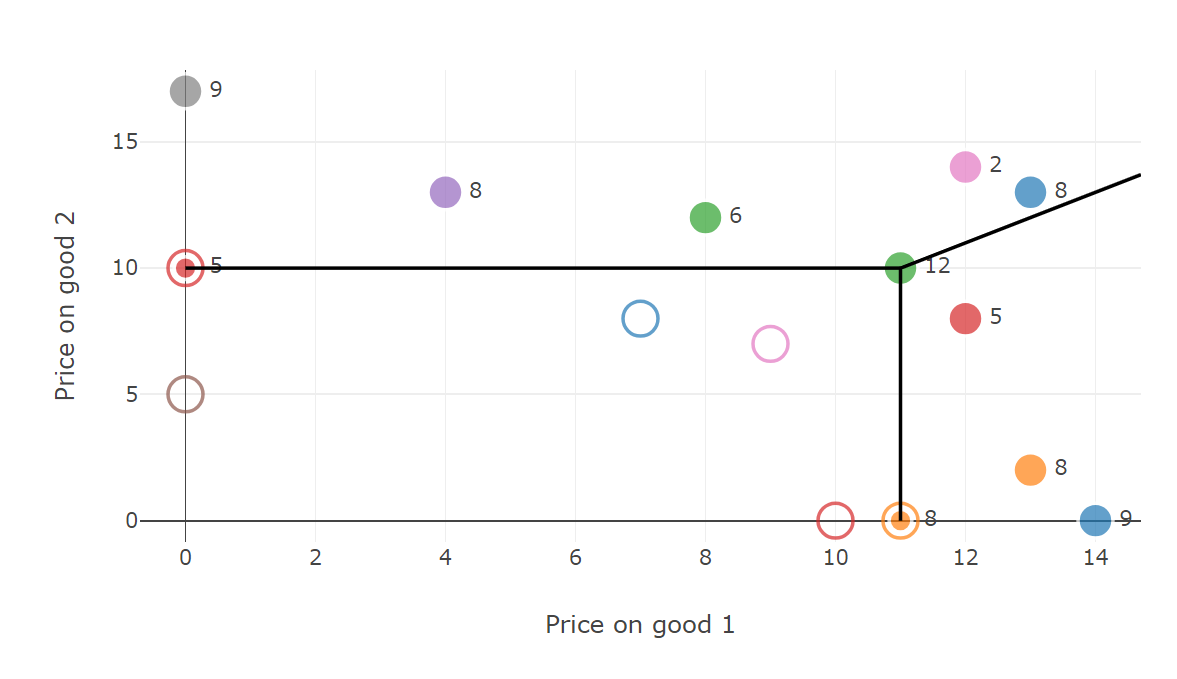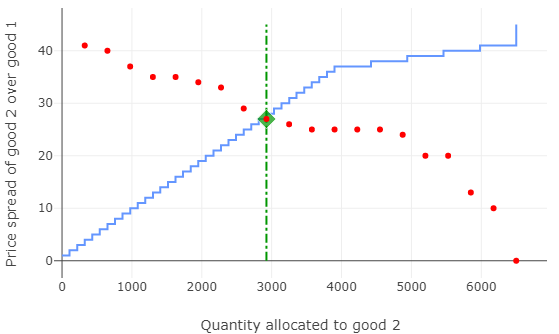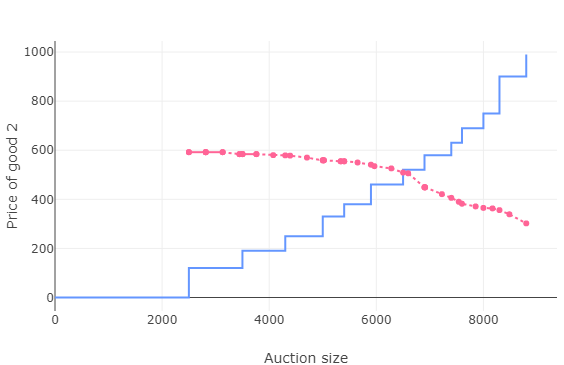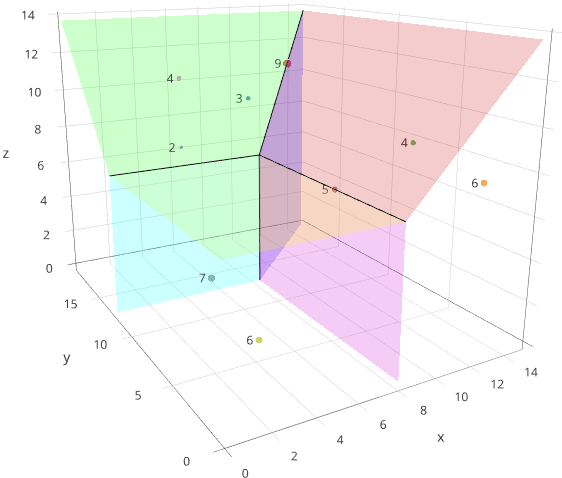Product-Mix Auctions
Product-Mix Auctions (PMAs) are easy-to-use, single-round, sealed-bid auctions to sell or procure multiple units of multiple related goods. They allow both the bidders and the auctioneer to express rich preferences about how the allocations they receive depend on the auction prices.
The original PMA was developed in 2007-8 for the Bank of England which now uses PMAs regularly. Multiple additional versions of the PMA have been developed since. This paper explains PMAs in more detail; this presentation gives an overview.

Try the PMA Web App
Our interactive web application is an easy way to try PMAs online. To get started, look at the demonstration or companion slides. The user guide gives more detail.
For other software implementations and web apps, see software.
The PMA Family
Standard PMA
Originally developed for the Bank of England (see Klemperer, 2008).
Bidders can express rich preferences. The Bank of England currently uses a version of this weekly, to allocate loans against different qualities of collateral.
Options include:
- maximising efficiency (the aggregate of the auctioneer's and bidders' profits), or maximising the auctioneer's profits
- uniform or discriminatory (pay-as-bid) pricing

Details
- Bidders simultaneously make sets of bids. Each bidder can make as many simple bids as desired.
- Each of a bidder's simple bids specifies:
- a good,
- a number of units to be bought of that good, and
- a maximum per-unit price for that good.
- A bidder can make simple bids on as many goods as desired.
- The auctioneer can also permit "OR" bids. An "OR" bid specifies:
- a list of goods,
- a total number of units to be bought of any of the goods in the list, and
- a maximum per-unit price for each good in the list.
- the auction accepts the offer on at most one of the goods listed by an "OR" bid (whichever is best for the bidder, given the prices set by the auction).
- The auctioneer can permit bidders to express even more sophisticated preferences.
- The auctioneer can express rich preferences about how the numbers of units of the different varieties to be sold is determined.
- Our software includes versions for ``strong-substitutes'' and ``all substitutes'' participant preferences.
This technical note gives more detail on how the Standard PMA is solved using linear programming.
Bellus PMA
A variant of the standard PMA was created as a platform for Bellus Ventures to allow developers of renewable energy projects to sell tax credits, and so allocate subsidies for clean energy more efficiently.
For software and more information, see the GitHub repository.
Arctic PMA
Originally developed for the Government of Iceland.
The Arctic PMA is for bidders with fixed budgets. It, e.g., allows an acquired firm's shareholders to exchange their shares for a choice of cash or shares in the acquiring firm, or (in Iceland’s case) allows creditors to exchange their claims for a choice among new debt instruments.

Details
- Bidders simultaneously make sets of bids. Each bidder can make as many simple bids as desired.
- Each of a bidder's bids specifies:
- a good,
- a budget (e.g., nominal amount of debt, or number of shares) to be exchanged for that good, and
- a maximum per-unit price for that good.
- A bidder can make simple bids on as many goods as desired.
- The auctioneer can also permit "OR" bids. An "OR" bid specifies
- a list of goods,
- a total budget (e.g., nominal amount of debt, or number of shares) to be exchanged for any of the goods in the list, and
- a maximum per-unit price for each good in the list.
- The auctioneer can express rich preferences about how the numbers of units of the different varieties to be sold is determined.
IMF Staff PMA
A version of the Arctic Auction was proposed by IMF staff to restructure sovereign debt. For a demonstration of this PMA version, and more information, see the IMF web app on the software page.
Software
Our software implementations are available under the (open source) Affero General Public Licence v3.0. Please let us know if you add, or make changes, to the source code, and please get in touch with us if you are interested in a custom implementation of the PMA for your application.
We are developing the software further, and welcome contributions.
You can find our software here. This includes:
- A publicly accessible web app for the Standard PMA.
- Windows and Mac software to run the Standard and Arctic PMA locally.
- Alternative implementations of the Strong-Substitutes PMA in Python and C++.
- Software to run the PMA developed for Bellus Ventures.
- A web app to demonstrate the PMA developed with IMF staff.

Academic Papers
A list of academic papers on the PMA can be found here.
Contact
Please send any questions, comments, and corrections to Elizabeth Baldwin, Paul Klemperer, or Edwin Lock.
Acknowledgements
We thank many collaborators and colleagues, especially Adam Gundry, Simon Finster, Maximilian Fichtl, and the authors of papers on the PMA.